高级英语Lesson 4 Inaugural Address
- 格式:ppt
- 大小:1.05 MB
- 文档页数:2
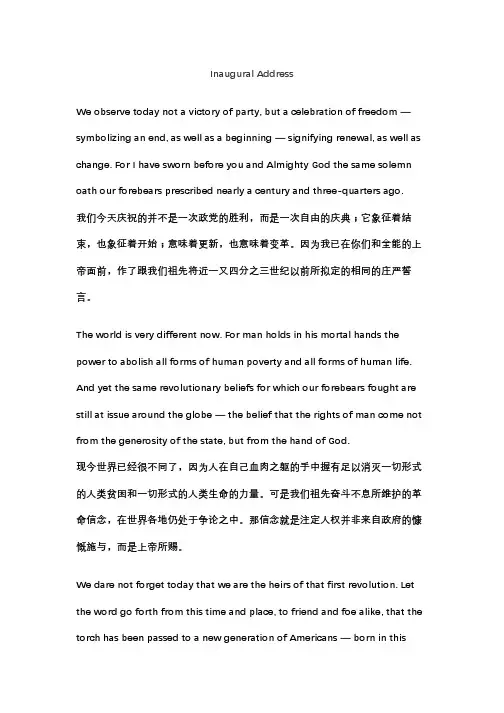
Inaugural AddressWe observe today not a victory of party, but a celebration of freedom —symbolizing an end, as well as a beginning — signifying renewal, as well as change. For I have sworn before you and Almighty God the same solemn oath our forebears prescribed nearly a century and three-quarters ago.我们今天庆祝的并不是一次政党的胜利,而是一次自由的庆典;它象征着结束,也象征着开始;意味着更新,也意味着变革。
因为我已在你们和全能的上帝面前,作了跟我们祖先将近一又四分之三世纪以前所拟定的相同的庄严誓言。
The world is very different now. For man holds in his mortal hands the power to abolish all forms of human poverty and all forms of human life. And yet the same revolutionary beliefs for which our forebears fought are still at issue around the globe — the belief that the rights of man come not from the generosity of the state, but from the hand of God.现今世界已经很不同了,因为人在自己血肉之躯的手中握有足以消灭一切形式的人类贫困和一切形式的人类生命的力量。
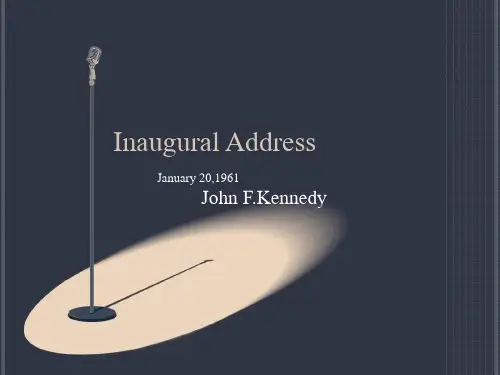
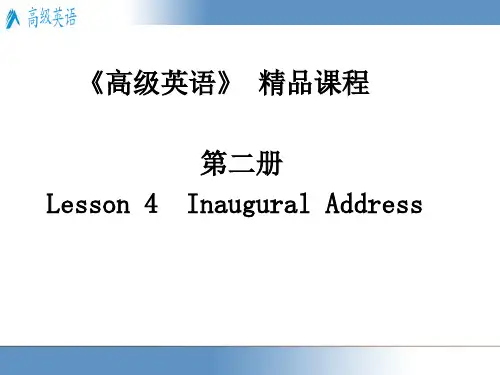
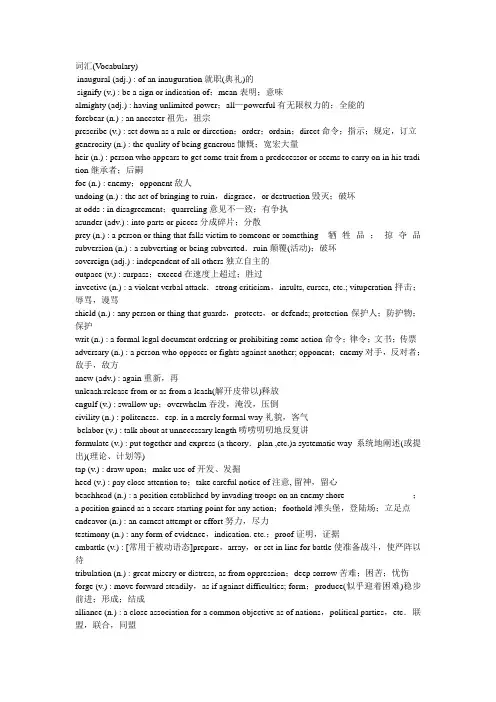
词汇(Vocabulary)inaugural (adj.) : of an inauguration就职(典礼)的signify (v.) : be a sign or indication of;mean表明;意味almighty (adj.) : having unlimited power;all—powerful有无限权力的;全能的forebear (n.) : an ancester 祖先,祖宗prescribe (v.) : set down as a rule or direction;order;ordain;direct命令;指示;规定,订立generosity (n.) : the quality of being generous慷慨;宽宏大量heir (n.) : person who appears to get some trait from a predecessor or seems to carry on in his tradi tion继承者;后嗣foe (n.) : enemy;opponent敌人undoing (n.) : the act of bringing to ruin,disgrace,or destruction毁灭;破坏at odds : in disagreement;quarreling意见不一致;有争执asunder (adv.) : into parts or pieces分成碎片;分散prey (n.) : a person or thing that falls victim to someone or something牺牲品;掠夺品subversion (n.) : a subverting or being subverted.ruin 颠覆(活动);破坏sovereign (adj.) : independent of all others独立自主的outpace (v.) : surpass;exceed在速度上超过;胜过invective (n.) : a violent verbal attack.strong criticism,insults, curses, etc.; vituperation 抨击;辱骂,谩骂shield (n.) : any person or thing that guards,protects,or defends; protection保护人;防护物;保护writ (n.) : a formal legal document ordering or prohibiting some action命令;律令;文书;传票adversary (n.) : a person who opposes or fights against another; opponent;enemy对手,反对者;敌手,敌方anew (adv.) : again重新,再unleash:release from or as from a leash(解开皮带以)释放engulf (v.) : swallow up;overwhelm 吞没,淹没,压倒civility (n.) : politeness.esp. in a merely formal way 礼貌,客气belabor (v.) : talk about at unnecessary length唠唠叨叨地反复讲formulate (v.) : put together and express (a theory.plan ,etc.)a systematic way系统地阐述(或提出)(理论、计划等)tap (v.) : draw upon;make use of开发、发掘heed (v.) : pay close attention to;take careful notice of注意, 留神,留心beachhead (n.) : a position established by invading troops on an enemy shore;a position gained as a secare starting point for any action;foothold滩头堡,登陆场;立足点endeavor (n.) : an earnest attempt or effort努力,尽力testimony (n.) : any form of evidence,indication. etc.;proof证明,证据embattle (v.) : [常用于被动语态]prepare,array,or set in line for battle使准备战斗,使严阵以待tribulation (n.) : great misery or distress, as from oppression;deep sorrow苦难;困苦;忧伤forge (v.) : move forward steadily,as if against difficulties; form;produce(似乎迎着困难)稳步前进;形成;结成alliance (n.) : a close association for a common objective as of nations,political parties,etc.联盟,联合,同盟短语at issue : in dispute;to be decided;at variance;in disagreement意见不一致例: What is at issue is the extent to which exam results reflect a student’s ability.意见的分歧之处在于考试对于学生能力的影响程度。
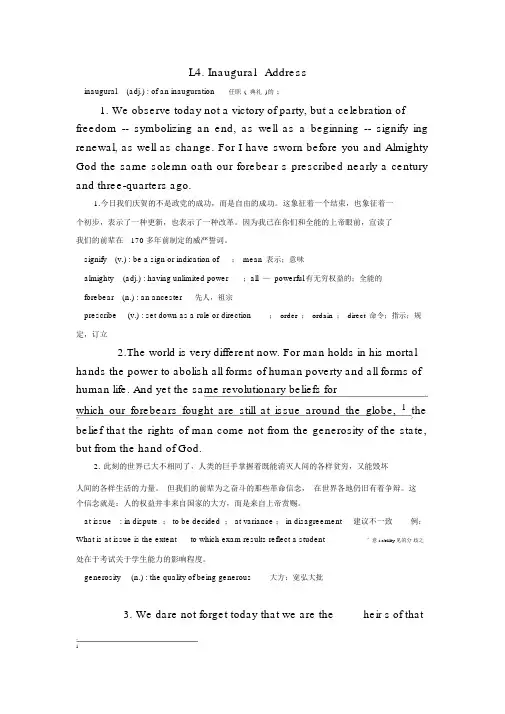
L4. Inaugural Addressinaugural (adj.) : of an inauguration任职(典礼)的;1. We observe today not a victory of party, but a celebration of freedom -- symbolizing an end, as well as a beginning -- signify ing renewal, as well as change. For I have sworn before you and Almighty God the same solemn oath our forebear s prescribed nearly a century and three-quarters ago.1.今日我们庆贺的不是政党的成功,而是自由的成功。
这象征着一个结束,也象征着一个初步,表示了一种更新,也表示了一种改革。
因为我已在你们和全能的上帝眼前,宣读了我们的前辈在170 多年前制定的威严誓词。
signify (v.) : be a sign or indication of;mean表示;意味almighty (adj.) : having unlimited power;all—powerful有无穷权益的;全能的forebear (n.) : an ancester先人,祖宗prescribe (v.) : set down as a rule or direction;order;ordain;direct命令;指示;规定,订立2.The world is very different now. For man holds in his mortal hands the power to abolish all forms of human poverty and all forms of human life. And yet the same revolutionary beliefs forwhich our forebears fought are still at issue around the globe, 1the belief that the rights of man come not from the generosity of the state, but from the hand of God.2.此刻的世界已大不相同了,人类的巨手掌握着既能消灭人间的各样贫穷,又能毁坏人间的各样生活的力量。
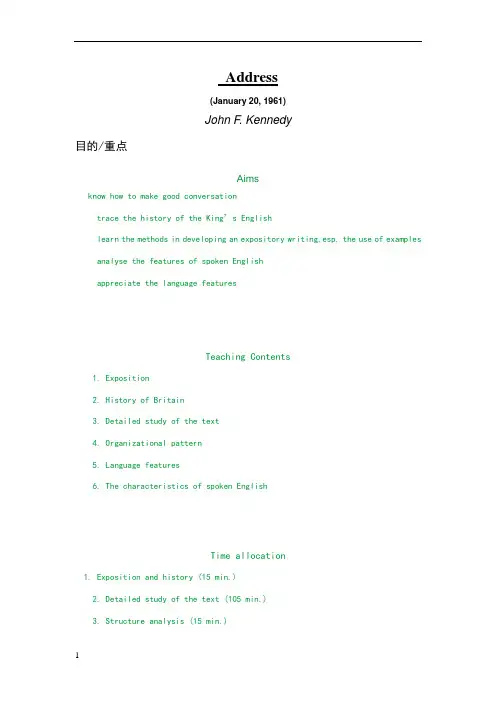
Address(January 20, 1961)John F. Kennedy目的/重点Aimsknow how to make good conversationtrace the history of the King’s Englishlearn the methods in developing an expository writing,esp. the use of examples analyse the features of spoken Englishappreciate the language featuresTeaching Contents1. Exposition2. History of Britain3. Detailed study of the text4. Organizational pattern5. Language features6. The characteristics of spoken EnglishTime allocation1. Exposition and history (15 min.)2. Detailed study of the text (105 min.)3. Structure analysis (15 min.)4. Language appreciation (15 min.)5. The characteristics of spoken English (30 min)课文内容4. Inaugural Address(January 20, 1961)John F. Kennedy1 We observe today not a victory of party but a celebration of freedom, symbolizing an end as well as a beginning, signifying renewal as well as change. For I have sworn before you and Almighty God the same solemn oath our forebears prescribed nearlya century and three-quarters ago.2 The world is very different now. For man holds in his mortal hands the power to abolish all forms of human poverty and all forms of human life. And yet the same revolutionary belief for which our forebears fought is still at issue around the globe, the belief that the rights of man come not from the generosity of the state but from the hand of God.3 We dare not forget today that we are the heirs of that first revolution. Let the word go forth from this time and place, to friend and foe alike, that the torch has been passed to a new generation of Americans, born in this century, tempered by war, disciplined by a hard and bitter peace, proud of our ancient heritage, and unwilling to witness or permit the slow undoing of these human rights to which this nation has always been committed, and to which we are committed today at home and around the world.4 Let every nation know, whether it wishes us well or i11, that we shall pay any price, bear any burden, meet any hardship, support any friend, oppose any foe to assure the survival and the success of liberty.5 This much we pledge--and more.6 To those old allies whose cultural and spiritual origins we share, we pledge the loyalty of faithful friends. United, there is little we cannot do in a host of co-operative ventures. Divided, there is little we can do, for we dare not meeta powerful challenge at odds and split asunder.7 To those new states whom we welcome to the ranks of the free, we pledge our word that one form of colonial control shall not have passed away merely to be replaced by a far more iron tyranny. We shall not always expect to find them supporting our view. But we shall always hope to find them strongly supporting their own freedom, and to remember that, in the past, those who foolishly sought power by riding the back of the tiger ended up inside.8 To those peoples in the huts and villages of half the globe struggling to break the bonds of mass misery, we pledge our best efforts to help them help themselves, for whatever period is required, not because the Communists may be doing it, not because we seek their votes, but because it is right. If a free society cannot help the many who are poor, it cannot save the few who are rich.9 To our sister republics south of our border, we offer a special pledge: to convert our good words into good deeds, in a new alliance for progress, to assist free men and free governments in casting off the chains of poverty. But this peaceful revolution of hope cannot become the prey of hostile powers. Let all our neighbors know that we shall join with them to oppose aggression or subversion anywhere in the Americas. And let every other power know that this hemisphere intends to remain the master of its own house.10 To that world assembly of sovereign states, the United Nations, our last best hope in an age where the instruments of war have far outpaced the instruments of peace, we renew our pledge of support: to prevent it from becoming merely a forum for invective, to strengthen its shield of the new and the weak, and to enlarge the area in which its writ may run.11 Finally, to those nations who would make themselves our adversary, we offer not a pledge but a request: that both sides begin anew the quest for peace, before the dark powers of destruction unleashed by science engulf all humanity in planned or accidental self-destruction.12 We dare not tempt them with weakness. For only when our arms are sufficient beyond doubt can we be certain beyond doubt that they will never be employed.13 But neither can two great and powerful groups of nations take comfort from our present course--both sides overburdened by the cost of modern weapons, both rightly alarmed by the steady spread of the deadly atom, yet both racing to alter that uncertain balance of terror that stays the hand of mankind's final war.14 So let us begin anew, remembering on both sides that civility is not a sign of weakness, and sincerity is always subject to proof. Let us never negotiate out of fear, but let us never fear to negotiate.15 Let both sides explore what problems unite us instead of belaboring those problems which divide us.16 Let both sides, for the first time, formulate serious and precise proposals for the inspection and control of arms and bring the absolute power to destroy other nations under the absolute control of all nations.17 Let both sides seek to invoke the wonders of science instead of its terrors. Together let us explore the stars, conquer the deserts, eradicate disease, tap the ocean depths and encourage the arts and commerce.18 Let both sides unite to heed in all corners of the earth the command of Isaiah to "undo the heavy burdens...(and) let the oppressed go free".19 And if a beachhead of co-operation may push back the jungle of suspicion, let both sides join in creating a new endeavor, not a new balance of power, but a new world of law, where the strong are just and the weak secure and the peace preserved.20 All this will not be finished in the first one hundred days. Nor will it be finished in the first one thousand days, nor in the life of this Administration, nor even perhaps in our lifetime on this planet. But let us begin.21 In your hands, my fellow citizens, more than mine, will rest the final success or failure of our course. Since this country was founded, each generation of Americans has been summoned to give testimony to its national loyalty. The graves of young Americans who answered the call to service surround the globe.22 Now the trumpet summons us again--not as a call to bear arms, though arms we need; not as a call to battle, though embattled we are; but a call to bear the burden of a long twilight struggle, year in and year out, "rejoicing in hope, patientin tribulation," a struggle against the common enemies of man: tyranny, poverty, disease and war itself.23 Can we forge against these enemies a grand and global alliance, North and South, East and West, that can assure a more fruitful life for all mankind Will you join in the historic effort24 In the long history of the world, only a few generations have been granted the role of defending freedom in its hour of maximum danger. I do not shrink from this responsibility; I welcome it. I do not believe that any of us would exchange places with any other people or any other generation. The energy, the faith, the devotion which we bring to this endeavor will light our country and all who serve it, and the glow from that fire can truly light the world.25 And so, my fellow Americans ask not what your country can do for you; ask what you can do for your country.26 My fellow citizens of the world, ask not what America will do for you, but what together we can do for the freedom of man.27 Finally, whether you are citizens of America or citizens of the world, ask of us here the same high standards of strength and sacrifice which we ask of you. With a good conscience our only sure reward, with history the final judge of our deeds, let us go forth to lead the land we love, asking His blessing and His help, but knowing that here on earth God's work must truly be our own.(from A Treasury of the World's Great Speeches, 1965)NOTES1. inaugural address: since 1937, Inauguration Day has been changed to Jan. 20. On this day every four years the newly elected president of the United States faces the people for the first time, takes the presidential oath of office and delivershis inaugural address.2. solemn oath: the presidential oath, traditionally administered by the Chief Justice, is prescribed in Article II, section 1 of the Constitution of the United States. The oath runs as follows: "I do solemnly swear (or affirm) that I will faithfully execute the Office of President of the United States, and will to the best of my ability, preserve, protect and defend the Constitution of the United States. "3. The belief that the rights of man.., hand of God: refers to a passage in the American Declaration of Independence: "We hold these truths to be self-evident, that all men are created equal, that they are endowed by their Creator with certain unalienable Rights, that among these are Life, Liberty and the pursuit of Happiness. "4. command of Isaiah: one of the greatest Hebrew prophets whose writings are extant (late 8th century B. C. ) ; venerated by rabbis as 2nd only to Moses. The Book of Isaiah, a book in the Old Testament of the Bible of the Christian, is believed to be a work of two authors of different periods; chapters 1--39 relate to the history of the Israelites; chapters 40--66 foretell the coming of the Messiah. The quotation in the text is taken from chapter 58, verse 6: "Is not this the fast that I have chosen to loose the bands of wickedness, to undo the heavy burdens, and to let the oppressed go free, and that ye break every yoke"教学教案背景知识课文详解文章结构修辞学习课文录像课文录音词汇短语词汇(Vocabulary): of an inauguration就职(典礼)的----------------------------------------------------------------------------------: be a sign or indication of;mean表明;意味----------------------------------------------------------------------------------: having unlimited power;all—powerful有无限权力的;全能的----------------------------------------------------------------------------------: an ancester 祖先,祖宗----------------------------------------------------------------------------------: set down as a rule or direction;order;ordain;direct命令;指示;规定,订立----------------------------------------------------------------------------------: the quality of being generous慷慨;宽宏大量----------------------------------------------------------------------------------: person who appears to get some trait from a predecessor or seems to carry on in his tradition继承者;后嗣----------------------------------------------------------------------------------: enemy;opponent敌人----------------------------------------------------------------------------------: the act of bringing to ruin,disgrace,or destruction毁灭;破坏----------------------------------------------------------------------------------: in disagreement;quarreling意见不一致;有争执----------------------------------------------------------------------------------: into parts or pieces分成碎片;分散----------------------------------------------------------------------------------: a person or thing that falls victim to someone or something牺牲品;掠夺品----------------------------------------------------------------------------------: a subverting or being subverted.ruin 颠覆(活动);破坏----------------------------------------------------------------------------------: independent of all others独立自主的----------------------------------------------------------------------------------: surpass;exceed在速度上超过;胜过----------------------------------------------------------------------------------: a violent verbal attack.strong criticism,insults, curses, etc.; vituperation 抨击;辱骂,谩骂----------------------------------------------------------------------------------: any person or thing that guards,protects,or defends; protection 保护人;防护物;保护----------------------------------------------------------------------------------: a formal legal document ordering or prohibiting some action命令;律令;文书;传票----------------------------------------------------------------------------------: a person who opposes or fights against another; opponent;enemy 对手,反对者;敌手,敌方----------------------------------------------------------------------------------: again重新,再----------------------------------------------------------------------------------: release from or as from a leash(解开皮带以)释放----------------------------------------------------------------------------------: swallow up;overwhelm 吞没,淹没,压倒----------------------------------------------------------------------------------: politeness.esp. in a merely formal way 礼貌,客气----------------------------------------------------------------------------------: talk about at unnecessary length唠唠叨叨地反复讲----------------------------------------------------------------------------------: put together and express (a theory.plan ,etc.)a systematic way 系统地阐述(或提出)(理论、计划等)----------------------------------------------------------------------------------: draw upon;make use of开发、发掘----------------------------------------------------------------------------------: pay close attention to;take careful notice of注意, 留神,留心----------------------------------------------------------------------------------: a position established by invading troops on an enemy shore;a position gained as a secare starting point for any action;foothold滩头堡,登陆场;立足点----------------------------------------------------------------------------------: an earnest attempt or effort努力,尽力----------------------------------------------------------------------------------: any form of evidence,indication. etc.;proof证明,证据----------------------------------------------------------------------------------: [常用于被动语态]prepare,array,or set in line for battle使准备战斗,使严阵以待----------------------------------------------------------------------------------: great misery or distress, as from oppression;deep sorrow苦难;困苦;忧伤----------------------------------------------------------------------------------: move forward steadily,as if against difficulties; form;produce(似乎迎着困难)稳步前进;形成;结成----------------------------------------------------------------------------------: a close association for a common objective as of nations,political parties,etc.联盟,联合,同盟----------------------------------------------------------------------------------短语 (Expressions): in dispute;to be decided;at variance;in disagreement意见不一致例: What is at issue is the extent to which exam results reflect a student’s ability.意见的分歧之处在于考试对于学生能力的影响程度。
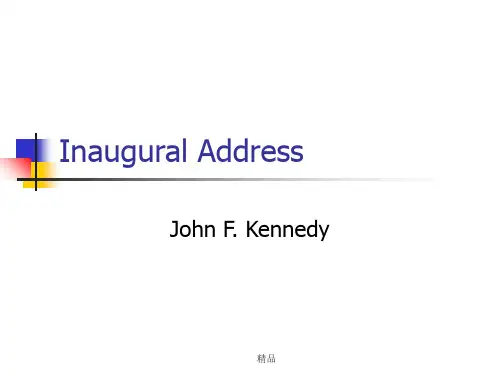
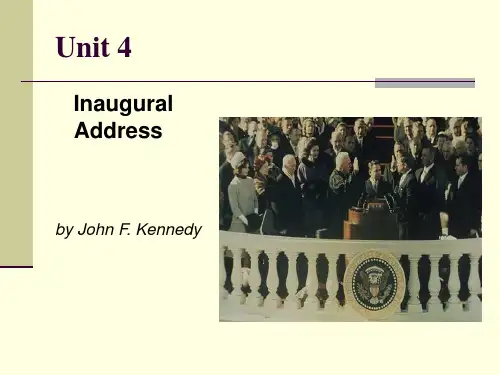
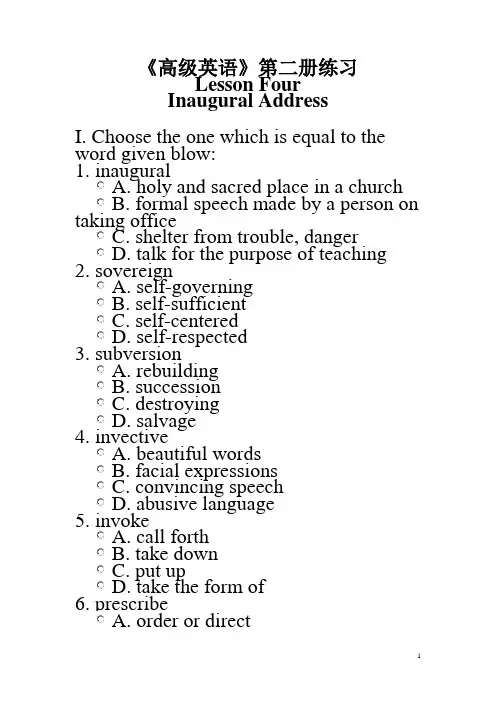
《高级英语》第二册练习Lesson FourInaugural AddressI. Choose the one which is equal to the word given blow:1. inauguralA. holy and sacred place in a churchB. formal speech made by a person on taking officeC. shelter from trouble, dangerD. talk for the purpose of teaching2. sovereignA. self-governingB. self-sufficientC. self-centeredD. self-respected3. subversionA. rebuildingB. successionC. destroyingD. salvage4. invectiveA. beautiful wordsB. facial expressionsC. convincing speechD. abusive language5. invokeA. call forthB. take downC. put upD. take the form of6. prescribeA. order or directB. produceC. protectD. agree7. tribulationA. contributionB. deliveryC. distributionD. great difficulty or trouble8. adversaryA. a person who gives adviceB. a friendC. an enemyD. a listener9. civilityA. rough mannersB. polite behaviourC. polite citizenD. rude person10. engulfA. swallow upB. consider aboutC. clean upD. imprint on11. heedA. rise on feetB. strike on the headC. give new life and strengthD. pay attention to12. shieldA. person or thing that protectsB. a court order prohibiting or ordering a given actionC. a person or animal inhabiting a specified placeD. an apparatus used in inhaling medicinal vapors13. asunderA. from belowB. apart in direction or positionC. in or to a low placeD. from an upright position14. belabourA. ask sb. to work hardB. set upon with too much talkC. furnish with powerD. force upon others15. eradicateA. cut into many small partsB. go round in circleC. draw together into a small spaceD. put an end to; destroy16. observeA. celebrateB. preserveC. orateD. help17. almightyA. intensiveB. all-powerfulC. instructiveD. all-round18. symbolizeA. make signalB. show pityC. representD. present19. undoingA. showingB. lazinessC. coverD. destruction20. permitA. fill inB. consentC. get intoD. explain21. commitA. pledgeB. omitC. refrainD. repeat22. hostA. a fewB. multitudeC. houseD. exclusion23. allianceA. dominationB. transactionC. disintegrationD. association24. castA. insertB. fallC. throwD. leap25. preyA. victimB. requireC. addressD. beg26. aggressionA. defenceB. invasionC. injuryD. disclosure27. outpaceA. fall behindB. step outC. walk outsidD. surpass28. anewA. once moreB. strangeC. famousD. weary29. testimonyA. evidenceB. witnessC. liberationD. trial30. inspectionA. predictionB. warm speechC. expectationD. examinationII. Complete the words according to the definitions, the first letter of the word is given:1. the sense of right and wrong cetc. mh6. to take an oath stake place fcourt of law, government, or other sth. wequator, or the horizon. hfor a common reason, as for a legislative,agreement nevidence or without proof s16. to call together saffection ltoward an end; an earnest attempt ededication dto happiness, well-being, or prosperity; aboon bpursuing something; a search. qleash uvariation, or fluctuation; uniform stGod or a sacred object as witness oan ancestor fVII. Translation:1. 他们的友谊是在困难时期由于同甘苦共患难而结成的。
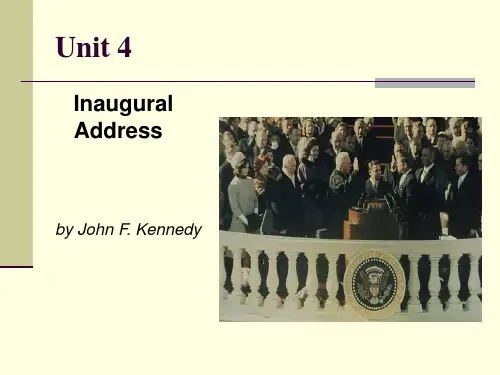
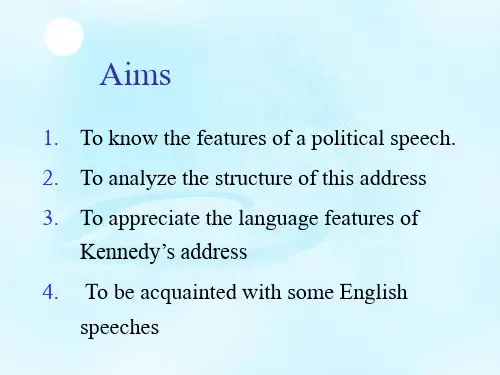
高级英语第4课Inaugural-Address-课件-翻译-译文4.Inaugural Address(January 20, 1961)John F. Kennedy目的/重点Aims1. To know how to make good conversation2. To trace the history of the King 's English3. To learn the methods in developing an expository writing,esp. the use of examples4. To analyse the features of spoken English5. To appreciate the language featuresTeaching Contents1. Exposition2. History of Britain3. Detailed study of the text4. Organizational pattern5. Language features6. The characteristics of spoken EnglishTime allocation1. Exposition and history (15 min.)2. Detailed study of the text (105 min.)3. Structure analysis (15 min.)4. Language appreciation (15 min.)5. The characteristics of spoken English (30 min)课文内容4. Inaugural Address(January 20, 1961)John F. Kennedy1 Weobserve today not a victory of party but a celebration of freedom, symbolizing an end as well asa beginning, signifying renewal as well as change. For I have sworn before you and Almighty God the same solemn oathour forebears prescribednearly a century and three-quarters ago.2 The world is very different now. For man holds in his mortal hands the powerto abolish all forms of human poverty and all forms of human life. And yet the same revolutionary belief for which our forebears fought is still at issue around the globe, the belief that the rights of man come not from the generosity of the state but from the hand of God.3 We dare not forget today that we are the heirs of that first revolution. Letthe word go forth from this time and place, to friend and foe alike, that the torchhas been passed to a new generation of Americans, born in this century, tempered by war, disciplined by a hard and bitter peace, proud of our ancient heritage, and unwilling to witness or permit the slow undoingof these human rights to which this nation has always been committed, and to which we are committed today at home and around the world.4 Let every nation know, whether it wishes us well or ill, that we shall pay any price, bear any burden, meet any hardship, support any friend, oppose any foe to assure the survival and the success of liberty.5 This much we pledge--and more.6 To those old allies whose cultural and spiritual origins we share, we pledge the loyalty of faithful friends. United, there is little we cannot do in a hostof co-operative ventures. Divided, there is little we can do, for we dare not meet a powerful challenge at oddsand split asunder.7 To those new states whom we welcome to the ranks of the free, we pledge our word that one form of colonial control shall not have passed away merely to be replaced by a far more iron tyranny. We shall not always expect to find themsupporting our view. But we shall always hope to find them strongly supporting their own freedom, and to remember that, in the past, those who foolishly sought power by riding the back of the tiger ended up inside.8 To those peoples in the huts and villages of half the globe struggling to break the bonds of mass misery, we pledge our best efforts to help them helpthemselves, for whatever period is required, not because the Communists may be doing it, not because we seek their votes, but because it is right. If a free society cannot help the many who are poor, it cannot save the few who are rich.9 To our sister republics south of our border, we offer a special pledge: to convert our good words into good deeds, in a new alliancefor progress, to assistfree menand free governments in casting off the chains of poverty. But this peaceful revolution of hope cannot become the preyof hostile powers. Let all our neighbors know that we shall join with them to oppose aggression or subversionanywherejn the Americas. And let every other power know that this hemisphere intends to remain the master of its own house.10 To that world assembly of sovereignstates, the United Nations, our last best hope in an age where the instruments of war have far outpaced the instruments ofpeace, we renew our pledge of support: to prevent it from becoming merely a forum for invective,to strengthen its shield of the new and the weak, and to enlarge the area in which its writmay run.11 Finally, to those nations who would make themselves our adversary, we offer not a pledge but a request: that both sides begin anew the quest for peace, beforethe dark powers of destruction unleashed by science engulfall humanity in planned or accidental self-destruction.12 We dare not tempt them with weakness. For only when our arms are sufficient beyond doubt can we be certain beyond doubt that they will never be employed.13 But neither can two great and powerful groups of nations take comfort from our present course--both sides overburdened by the cost of modern weapons, bothrightly alarmed by the steady spread of the deadly atom, yet both racing to alterthat uncertain balance of terror that stays the hand of mankind's final war.14 So let us begin anew, remembering on both sides that civilityis not a sign of weakness, and sincerity is always subject toproof.Let us never negotiate out of fear, but let us never fear to negotiate.15 Let both sides explore what problems unite us instead of belaboringthose problems which divide us.16 Let both sides, for the first time, formulate serious and precise proposals for the inspection and control of arms and bring the absolute power to destroy other nations under the absolute control of all nations.17 Let both sides seek to invoke the wonders of science instead of its terrors. Together let usexplore the stars, conquer the deserts, eradicate disease, tapthe ocean depths and encourage the arts and commerce.18 Let both sides unite to heed in all corners of the earth the command of Isaiahto "undo the heavy burdens...(and) let the oppressed go free".19 And if a beachheadof co-operation may push back the jungle of suspicion, let both sides join in creating a new endeavor, not a new balance of power, buta new world of law, where the strong are just and the weak secure and the peace preserved.20 All this will not be finished in the first one hundred days. Nor will itbe finished in the first one thousand days, nor in the life of this Administration, nor even perhaps in our lifetime on this planet. But let us begin.21 In your hands, myfellow citizens, more than mine, will rest the final success or failure of our course. Since this country was founded, each generation ofAmericans has been summoned to give testimonyto its national loyalty. The graves of young Americans who answered the call to service surround the globe.22 Now the trumpet summons us again--not as a call to bear arms, though arms we need; not as a call to battle, though embattled we are; but a call to bear theburden of a long twilight struggle, year in and year out, "rejoicing in hope, patientin tribulation,"a struggle against the common enemies of man: tyranny, poverty, disease and war itself.23 Can we forge against these enemies a grand and global alliance, North and South, East and West, that can assure a morefruitful life for all mankind? Willyou join in the historic effort?24 In the long history of the world, only a few generations have been granted the role of defending freedom in its hour of maximum danger. I do not shrink from this responsibility; I welcome it. I do not believe that any of us would exchange places with any other people or any other generation. The energy, the faith, the devotion which we bring to this endeavor will light our country and all who serve it, and the glow from that fire can truly light the world.25 And so, my fellow Americans ask not what your country can do for you; ask what you can do for your country.26 My fellow citizens of the world, ask not what America will do for you, but what together we can do for the freedom of man.27 Finally, whether you are citizens of America or citizens of the world, ask of us here the same high standards of strength and sacrifice which we ask of you. With a good conscienceour only sure reward, with history the final judge of our deeds, let us go forth to lead the land we love, asking His blessing and His help, but knowing that here on earth God's work must truly be our own.(from A Treasury of the World's Great Speeches, 1965) NOTES1. inaugural address: since 1937, Inauguration Day has been changed to Jan. 20.On this day every four years the newly elected president of the United States faces the people for the first time, takes the presidential oath of office and delivers his inaugural address.2. solemn oath: the presidential oath, traditionally administered by the Chief Justice, is prescribed in Article II, section 1 of the Constitution of the United States. The oath runsas follows: "I do solemnly swear (or affirm) that I will faithfully execute the Office of President of the UnitedStates, and will to the best of my ability, preserve, protect and defend the Constitution of the United States."3. The belief that the rights of man.., hand of God: refers to a passage in the American Declaration of Independence: "We hold these truths to be self-evident,that all menare created equal, that they are endowedby their Creator with certain unalienable Rights, that amongthese are Life, Liberty and the pursuit of Happiness. "4. commandf Isaiah: one of the greatest Hebrew prophets whosewritings are extant (late 8th century B. C. ) ; venerated by rabbis as 2nd only to Moses. The Book ofIsaiah, a book in the Old Testament of the Bible of the Christian, is believed tobe a work of two authors of different periods; chapters 1--39 relate to the history of the Israelites; chapters 40--66 foretell the coming of the Messiah. The quotation in the text is taken from chapter 58, verse 6: "Is not this the fast that I havechosen? to loose the bands of wickedness, to undo the heavy burdens, and to let the oppressed go free, and that ye break every yoke?"教学教案背景知识课文详解文章结构修辞学习课文录像课文录音词汇短语词汇(Vocabulary)inaugural (adj.) : of an inauguration 就职(典*L)的——signify (v.) : be a sign or indication of ; mean表明;意味——almighty (adj.) : having unlimited power ; all — powerful 有无限权力的;全能的——forebear (n.) : an ancester 祖先,祖宗——prescribe (v.) : set down as a rule or direction ;order ;ordain ;direct 命令;指示;规定,订立——generosity (n.) : the quality of being generous 慷慨;宽宏大量——heir (n.) : person who appears to get some trait from a predecessor or seems to carry on in histradition 继承者;后嗣——foe (n.) : enemy ; opponent 敌人undoing (n.) : the act of bringing to ruin ,disgrace , ordestruction 毁灭;破坏at odds : in disagreement ;quarreling 意见不一致;有争执asunder (adv.) : into parts or pieces 分成碎片;分散prey (n.) : a person or thing that falls victim to someone or something牺牲品; 掠夺品subversion (n.) : a subverting or being subverted ruin颠覆(活动);破坏sovereign (adj.) : independent of all others 独立自主的outpace (v.) : surpass ; exceed 在速度上超过;胜过invective (n.) : a violent verbal attack . strong criticism , insults, curses, etc.;vituperation 抨击;辱骂,谩骂shield (n.) : any person or thing that guards , protects , or defends; protection保护人;防护物;保护writ (n.) : a formal legal document ordering or prohibiting some action 命令;律令;文书;传票adversary (n.) : a person who opposes or fights against another; opponent ; enemy 对手,反对者;敌手,敌方anew (adv.) : again 重新,再unleash (v.) : release from or as from a leash( 解开皮带以)释放heed (v.) : pay close attention to ;take careful notice of 注意,留神,留心beachhead (n.) : a position established by invading troops on an enemy shore ; aposition gained as a secare starting point for any action ;foothold 滩头堡,登陆场;立足点endeavor (n.) : an earnest attempt or effort 努力, 尽力testimony (n.) : any form of evidence , indication. etc. ;proof 证明,证据embattle (v.):[ 常用于被动语态 ]prepare , array , or set in line for battle 使准备战斗,使严阵以待tribulation (n.) : great misery or distress, as from oppression 难;困苦;忧伤;deep sorrow 古forge (v.) : move forward steadily , as if against difficulties; form 乎迎着困难)稳步前进;形成;结成;produce(似alliance (n.) : a close association for a commonobjective as of nations , political parties , etc .联盟,联合,同盟engulf (v.) : swallow up ; overwhelm 吞没,淹没,压倒civility (n.) : politeness . esp. in a merely formal way 貌,客气belabor (v.) : talk about at unnecessary length 唠唠叨叨地反复讲formulate (v.) : put together and express (a theory 系统地阐述(或提出)(理论、计划等)tap (v.) : draw upon ; make use of 开发、发掘plan ,etc.)a systematic way短语(Expressions)at issue : in dispute ; to be decided ; at variance ; in disagreement 意见不一致例: What is at issue is the extent to which exam results reflect a student 's ability. 意见的分歧之处在于考试对于学生能力的影响程度。
inaugural address课文尊敬的主席先生,尊敬的各位嘉宾,我的优秀同事们,大家好!我非常荣幸和激动能够站在这里,发表我的就职演说。
首先,我想向所有投票支持我的人表示感谢。
我很清楚,我所在的职位代表着成千上万人的声音和信任。
我对此感到沉甸甸的责任和鞭策,在此我向全国人民郑重承诺,我将全心全意为民服务,一如既往地关心全体国民福祉,并致力于保障他们的合法权益。
我深知,当今中国面临着众多的挑战。
我们的国家已经变得更加复杂,充满了不确定性和变数,我们的行动必须迅速而准确,因为在这个时代,我们没有任何的退路。
我们的责任是承担起一切困难,为我们国家的未来做好准备。
我要强调的是,我们必须尽一切力量来维护国家的稳定和民族的团结。
应对外部挑战和内部分裂,整个中华民族不可动摇,且团结。
我们的信条是“和而不同”,我们的责任是协调着前进。
在全球时代,我们必须紧紧依托科技创新。
我们必须提高我们的知识储备,不断创新,并通过全球性的合作来解决我们的共同问题。
在这方面,我们已经取得了很多成绩,但还有进一步的挑战等着我们。
我们需要创造一个更加宽松的环境,以便创新性想法和技术得到发展和应用。
我们近年来推动了经济和社会的全面发展。
我们的经济现在已经超越了发达国家中的大多数,我们的教育和医疗等各个领域也都得到了发展。
但我们还有很多工作要做。
我们必须致力于打造有特色,有优势的经济体系,促进在市场竞争中取得更大的优势,努力提高我们企业、人才、技术的国际竞争力。
我们的目标是要建立一个强大的中国。
对于伟大的中国梦,我们必须有长期的眼光和坚定的信念。
我们必须致力于建设一个持久、可持续、繁荣的国家。
在这个过程中,我们必须保护环境,让她充满活力,同时也要关注社会公正问题,公平地为每个普通人提供未来的希望。
值此就职之际,我要坚定地表示,我的一生将永远属于中国。
我会全心全意地服务于中华民族,我会关爱每一个人民群众,我会一直为实现中国梦而努力工作!感谢大家!。
⾼级英语Lesson4InauguralAddressADVANCED ENGLISHBOOK 2UNIT FOURINAUGURAL ADDRESSDetailed study of the textREAD THE SPEECH.1. political speecha). Political speech - made by politicians.Most Western politicians are good public speakers by their very training. And Kennedy is no exception.Question: What do you think of George W. Bush as a public speaker? (Search the internet for answers)b). Object of political speech:to explain, convince and persuade the people that what he is saying and planning to do best represents their interests so they should support him.Some features of the speechc). Audience of Kennedy’s inaugural speechAmerican people,different groups of nations in the international community Task: Identify the respective paragraphs in the speech that are directed to each audience.Answer: 1-5 + 20-27; 6-9+11-19d). Historical and political background of Kennedy’s speechThe cold war period when the world was divided into two hostile camps.Question: Are there any indications in the speech about the cold war and the two hostile camps? If yes, give some examples.e). Well organized and highly rhetorical. Mostly persuasion with verylittle explanation.But how to persuade without giving convincing facts and reasons?-To employ suitable rhetorical devices and words to create the desired emotional impact.-When the audience is excited and does not have much time to think or when the audience is already susceptible to the message of the speaker.Task: Identify the rhetorical devices employed in the speech to create the desired emotional impact. Illustrate with examples.f). Kennedy’s deliberate use of a pseudo-Roman style or Biblicallanguage in some places hoping to add solemnity to some of hisweightier sayings.And yet the same revolutionary belief for which our forbears fought is still at issue around the globe, the belief that the rights of man come not from thegenerosity of the state but from the hand of God. (para. 2)Let the word go forth from this time and place … (para. 3)g). Logically, the whole speech could be divided into the following parts.Task: Summarize the main idea of each part with one sentence.Paragraphs 1 – 5:a general statement of basic policy goals.Paragraphs 6 – 9:addresses different groups of allied nations or would-be allies.Paragraph 10:speaks to the UNParagraphs 11 – 19:speaks to his enemy.Paragraphs 20 – 27:appeals to his countrymen for support and sacrifice. Paragraph 12. In this paragraph Kennedy is emphasizing the importance of his election as president.Question: What do the following terms refer to?Victory of party:the victory of the Democratic Party over the Republican Party.Freedom:the freedom of people to elect freely their own head of state.An end:the end of Eisenhower?s presidential termA beginning:the beginning of Kennedy?sRenewal:the presidency or office of president is renewed or continuedChange:the president has changed from Eisenhower to Kennedy.3. For I have … a century and three-quarters ago.There is an end and a beginning, a renewal and a change “for” he has just sworn to become the new president. Question: Who set down the solemn oath a century and three-quartersago?The first presidential oath was taken by George Washington on April 30, 1789.Paragraph 24. For man holds … human life.Mortal: of man (as a being who must eventually die) 凡⼈的; ⼈类的Immortal: Not subject to death,不死的Question: What power do man have to abolish all forms of human poverty?Man has made great progress in science and technology so he has the power(scientific farming, speedy transportation, mass production, etc.) to abolish poverty, Question: What power do man have to abolish all forms of human life?but he also has the power (missile, H. bombs, etc.) to destroy humanlife.Hence the world is different now.5. And yet the same revolutionary belief for which our forebears fought is still at issue around the globe, the belief that …The belief: refer to Note 3 on page 56.At issue: in dispute; still to be decidedExplain the sentenceOur ancestors fought a revolutionary war to maintain that all men were createdequal and God had given them certain unalienable rights which no state or rulercould take away from them. But today this issue has not yet been decided in many countries around the world. Paragraph 36. We dare not … first revolution.Question: What was the first revolution?The revolutionary war – the war of independence (1775-1783).Question: What are “heirs of that first revolution” supposed to remember?We dare not forget that we are the descendants of those who fought the firstrevolutionary war – the war of independence. Hence we must always bear in mind the beliefs and ideals our ancestors fought and died for. We must be prepared, ifnecessary, to fight and die for them today.7. Let the word go forth … around the world.Let the word go forth … foe alike:A biblical style. In simple English he might have said:“Here and now, I would like to tell my friends and my enemies …”.Identify the rhetorical device used in “friend and foe”.Alliteration.Torch:a figurative use, meaning “inspirations and ideals”Tempered by war:Which war does Kennedy refer to here?By the time of the speech, the Americans of the 20th century fought two worldwars, so they are well tempered.Disciplined:received training that developed self control and characterHard and bitter peace:peace but cold war, hence “hard and bitter”To witness or permit the slow undoing:to see or allow the gradual abolishing ofCommitted to:bound by promise, pledgedParagraph 48. Let every nation know … of liberty.This paragraph, like the preceding one, is addressed to friend and foe at the same time. It promises to support any friend and to oppose any foe.The phrases “pay any price, bear any burden and meet any hardship” are intended to shore up the waning confidence of her allies as much as to warn any prospective foe.Paragraphs 3 & 4Summarize the main idea of paragraphs 3 & 4.In paragraphs 3 and 4, Kennedy exhorts his countrymen and forcefully declares his determination to “pay any price” to defend human rights and liberty at home and around the world. Paragraph 59. This much … and more.This much we promise to do and we promise to do more.Question: What is the function of this one sentence paragraph?The one sentence paragraph functions as a transition from the general to the specific. In the following paragraphs he will be addressingdifferent specific groups of nations.Paragraph 610. Read paragraph 6 and answer the questions.Questions: Whom does Kennedy address in this paragraph? How do you know?In this paragraph Kennedy addresses the white European countries in general but his words are specifically directed to the English-speaking Anglo-Saxon countries, such as Britain, Canada, Australia, New Zealand, with whom the United States shares a common cultural and spiritual heritage.Question: What do “cultural and spiritual origins” refer to?Cultural and spiritual origins:Greek, Roman and Nordic mythology, literature, art, music etc.Later these nations were linked closer by the spiritual tie of Christianity Question: What is the rhetorical device employed in the two sentences?“Divided, …we cannot do …. United, … little we can do …”.AntithesisPowerful challenge:Perhaps Kennedy is here referring to what he thinks to be a strongthreat posed by the socialist camp.At odds:In disagreement; quarrelingSplit asunder:Split apart; disunitedParagraphs 7 & 811. Read paragraphs 7 & 8.Question: Whom does Kennedy address in these paragraphs and what does he say?Kennedy addresses the governments and people of the newly independent countries, the third world developing countries. He promises to give them economic aid but warns them not to go over to the Communists.Paragraph 712. To those new states … iron tyranny.Ranks of the free:The community of free and independent nationsA far more iron tyranny:An expression that Kennedy uses in place of “a Communistdictatorship”Question: What is Kennedy saying here? Explain the sentence. Question: What is Kennedy saying here? Explain the sentence. ?Kennedy promises to aid the newly independent countries so that they can remain free and independent.13. Those who foolishly … ended up inside.Questions: What does “riding the back of a tiger” refer to? And what is the rhetoricaldevice employed here?Metaphor, comparing “seeking the aid of socialist countries” to “riding the back of a tiger”.Question: What does “ended up inside” mean?Those countries which foolishly seek the aid of socialist countries will end up by losing their independence as many other countries did in the past. Paragraph 814. To those peoples in huts … mass misery.Questions: What peoples is Kennedy referring to here? How do youknow?Referring to the poor and backward people in Africa and Asiastruggling to free themselves from poverty and suffering.Half the globe:the continents of Africa and Asia constitute almost one half of the land surface of the globe.15. We pledge our best efforts …is right.Here Kennedy wants people to believe that the United States renders unselfish anddisinterested aid to countries that need it.Question: But do you believe he is sincere when saying these?This is pure propaganda for the United States has never rendered any aid to those countries that pursue an independent foreign policy which runs counter to the“national interests of the United States”.Help them help themselves:“God help those who help themselves”.ExplainWe will help them only if they also do their bit. In other words they must cooperate with us, do what we ask them to do. 16. If a free society … who are rich.Translate this sentence into Chinese如果⼀个⾃由社会不去帮助那些⼈数众多的贫困者,那么少数富⼈⼜怎能保全下去呢?Rhetorical device employ here is _________Antithesis…few? and …rich? is balanced against ____________…many? and …poor?.Question: Do you think Kennedy is right in saying that?In a sense Kennedy is right. If the poor are continuously exploited and oppressed, they will rise up some day and over throw the …free society? or the rule of …the few who are rich?.Paragraph 917. In paragraph 9, Kennedy addresses ___________.all the countries lying to the south of the United States in Central and SouthAmerica.Various names have been given by various U.S. presidents to their Latin Americanpolicies, e.g. “dollar diplomacy”, “good neighbour” and now Kennedy?s “alliance for progress”.The United States has always tried to dominate these countries and has quite ofteninterfered in their internal affairs.18. To our sister … a special pledge.Question: Why do you think Kennedy uses the words “sister” and “special” here?The words “sister” and “special” show the traditional “special” interest of the United States in this area.The word “sister” connotes equality and mutual good relations. Kennedy carefully choose this word an attempt toallay the traditional fears these countries have of their powerful big brother in the north.19. New alliance for progressThe new Latin American policy propounded by Kennedy; to worktogether once again as allies to promote progress in this hemisphere. 20. But his peaceful … of hostile powers. Rhetorical device employed here is _________Metaphor, comparing “peaceful revolution of hope” to_____________ an animal which might fall victim to enemy nations.ParaphraseWe will not allow any enemy country to subvert this peaceful revolution which brings hope of progress to all our countries.21. And let every other … its own house.Rhetorical device employed here is ________Metaphor, comparing the Americas to _____a house.ExplainAnd let every country know the nations of this hemisphere will nottolerate any interference in their affairs by countries outside thishemisphere.Paragraph 1022. Read paragraph 10 and answer the question.Questions: Whom does Kennedy address in this paragraph? And whatdoes he say?In this paragraph Kennedy pledges his support to the UN.In this paragraph he lapses into Biblical style.“To strengthen its shield of the new and the weak, and to enlarge thearea in which its writ may run.”24. Our last best hope … instruments of peace.OutpaceTo surpass or outdo (another), as in speed, growth, or performance.超过, 如在速度、⽣长或表现上胜过(另⼀个)或⽐(另⼀个)做得好“Instruments of war” refer to -weapons, bombs, machines, etc., for waging war, IN CHINESE,战争利器“Instruments of peace” refer to -Tools, machines, etc., for producing of useful commodities, IN CHINESE和平⼿段ParaphraseThe UN is our last and best hope of survival in an age where the instruments of war have far surpassed and exceeded the instruments of peace.25. To prevent it … for invective.Invective:A violent verbal attack; strong criticism, insults, curses, etc.To prevent the UN from becoming an assembly where people justcriticize, insult and abuse each other.26. To strengthen … and the weak.Identify the rhetorical device employed here.Metaphor, comparing _________ to __________.the power of the UN to protect of a shield.ParaphraseWe pledge to strengthen the power of the UN to protect the newlyindependent and the weak nations.27. And to enlarge … may run.This like the proceeding phrase, is written in a Biblical style.Area:may mean either “territory, number of countries” or “fields of activity”Writ:(archaic) a formal written document; specifically: a legal instrument in letter form issued under seal in the name of the English monarch from Anglo-Saxon times to declare its grants, wishes andcommands.令状,由法院发布的书⾯命令Here it refers to the UN Charter. This word is usually used with the verb, “run”– to continue in effect or forceParaphraseWe pledge to help the UN enlarge the area in which its authority and mandate would continue to be in effect or in force. Paragraphs 11 - 2028. In Paragraphs 11 to 20, Kennedy addresses his enemy.Question: What does he say here?He points out the destructive power of a war and puts forward proposals for arms control negotiation, cooperation in fields of science and space exploration, etc.Paragraph 1129. Finally, to those nations … but a request.In this sentence the speaker is very careful in his choice of words.“Would make themselves our adversary”, what does these words imply?This phrase throws the blame for confrontation and world tension on the otherparty. This US has done nothing to create enemies. It?s the other side that ischallenging the US.Request:not a pledge or promise to do something. He is only “asking” the other side toconsider seriously his proposals.30. Before the dark … self-destruction:Before the terrible forces of destruction, which science cannow release, overwhelm mankind;before this self-destruction, which may be planned or brought about by an accident, takes place.Paragraph 1231. We dare not tempt them with weakness.We dare not be weak because it might tempt the enemy to take rash actions. So we must arm ourselves. Apolicy of negotiating from a position of strength. 32. For only … never be employed.Explain.If we are strong our enemy will not dare to attack us. Hence,our military might will never be employed. Notice therepetition of the phrase “beyond doubt”.Paragraph 1333. But neither can two … present course.The two great and powerful groups of nations, which are ____________.(one group headed by the Soviet Union and the other group headed by the U.S.) find no comfort in (are quite worried about) the presentinternational situation, which is __________.(cold war and hostile confrontation).34. Both sides overburdened … deadly atom.“deadly atom” stands for _______The “terrible atomic weapons or bombs”.ParaphraseBoth sides are feeling the great financial burden of the armsrace and both sides are alarmed by the proliferation of atomic weapon.35. Yet both racing … mankind?s final war.Identify the rhetorical device employed in the sentence.Synecdoche,提喻,其表达⽅式通常为:⽤⼀个事物的局部来表⽰整体,或以整体表⽰局部;⽤抽象和具体的概念进⾏互为替代;单数和复数进⾏互代;⽤⽣产⽤的原料替代产成品。